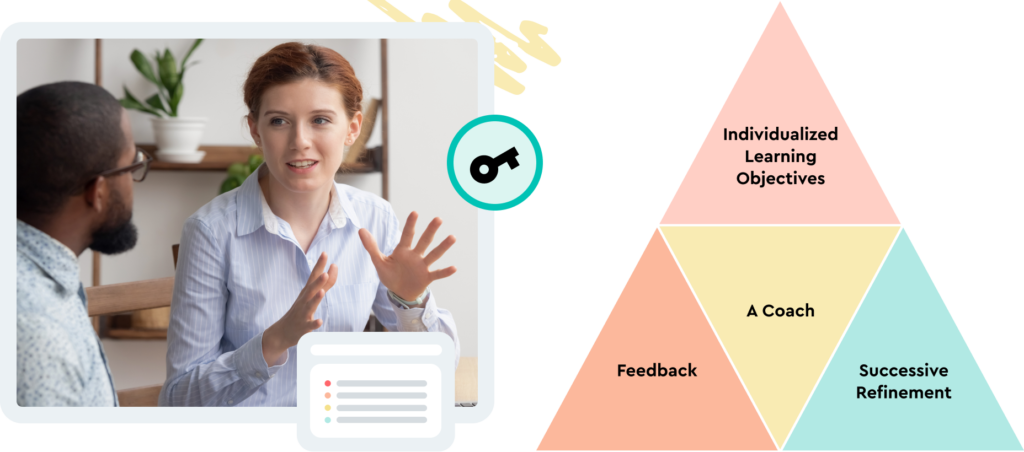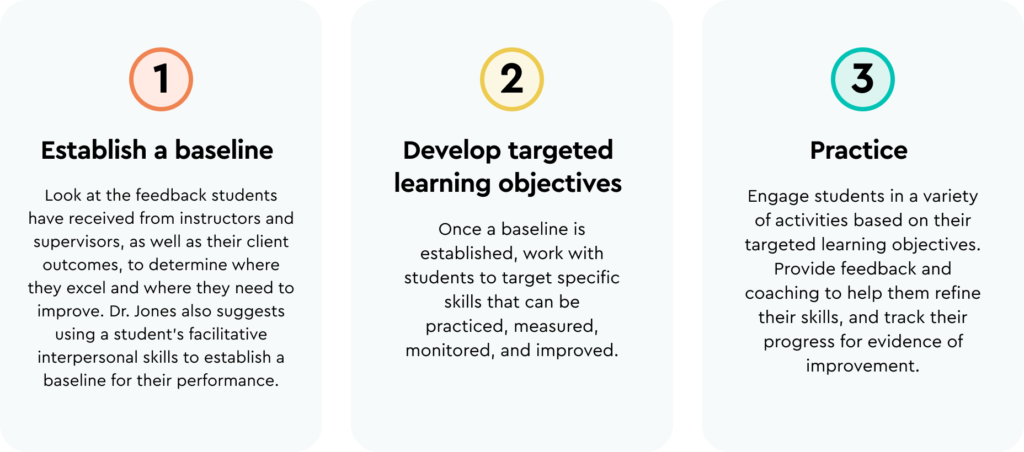In a recent GoReact webinar, Dr. Adam Jones, Assistant Professor of Marriage and Family Therapy at Texas Woman’s University, explained the benefits of deliberate practice for psychology education.
“Think of it as working out at the gym,” said Dr. Jones. “One study … found that [therapists] who regularly engaged in deliberate practice activities had significantly better outcomes than those who didn’t.”
Using deliberate practice as part of an instructional scaffolding strategy, Dr. Jones helps graduate students at TWU become more effective therapists. Keep reading to learn how it works and how you can use it to coach students as they refine their skills.
What Is Deliberate Practice?
According to “The Cambridge Handbook of Expertise and Expert Performance,” deliberate practice is “the intentional repeated execution, usually under the instruction of a coach, of skills directly relevant to improving the performance in question.”
Co-authored by K. Anders Ericsson, a Swedish psychologist known as the expert on expertise, The Handbook explores factors that separate top, average, and low performers in a variety of fields. In their research, Ericsson and his colleagues found the key difference for top performers was deliberate practice.
Breaking down the application of deliberate practice in their book, “Better Results: Using Deliberate Practice to Improve Therapeutic Effectiveness,” Dr. Scott Miller and colleagues from the International Center for Clinical Excellence identified the four elements required for deliberate practice. As shown in the chart below, they include: 1. individualized learning objectives, 2. a coach, 3. feedback, and 4. successive refinement.

Using Deliberate Practice in Psychotherapy Programs
Dr. Jones said psychotherapy programs are beginning to incorporate deliberate practice into training, but he emphasized that it isn’t the same as other types of practice such as purposeful practice or naive practice.
In purposeful practice, students focus on a specific skill or therapeutic concept until they’re comfortable with the concept. In naive practice, they simply assume the more they do something, the better they’ll get, even though research shows most therapists have worse outcomes later in their career because experience makes them overconfident.
He said deliberate practice is more about identifying “skills just outside of the therapist’s current ability … where we can challenge [them] to reach just a little bit further.” He outlined three steps to help frame deliberate practice for psychology education:
- Establish a baseline. Look at the feedback students have received from instructors and supervisors, as well as their client outcomes, to determine where they excel and where they need to improve. Dr. Jones also suggests using a student’s facilitative interpersonal skills to establish a baseline for their performance.
- Develop targeted learning objectives. Once a baseline is established, work with students to target specific skills that can be practiced, measured, monitored, and improved.
- Practice. Engage students in a variety of activities based on their targeted learning objectives. Provide feedback and coaching to help them refine their skills, and track their progress for evidence of improvement.

The Importance of Feedback for Graduate Therapists
Feedback is crucial for all learners, but Dr. Jones emphasized its importance for graduate therapists because it’s “most likely the only time when [they’ll] be getting very direct feedback on their work.”
With that in mind, Dr. Jones has changed how he teaches students in his master’s and doctoral programs. Using deliberate practice, which is heavily focused on coaching and feedback, he helps “give them a trajectory of success that will carry them through their career, helping them recognize what their work is, how effective they are, and ways that they can continue to build a system for improving those outcomes.”
To coach and give students feedback on their practice and progress—and to help them evaluate their own strengths and weaknesses—Dr. Jones uses GoReact video assessment software. GoReact supports deliberate practice through:
- Video recording features that make it easy to record virtual therapy sessions, role-plays, or other clinical learning activities on any device and upload them for review
- Multimodal feedback tools that allow instructors and supervisors to leave written, audio, or video comments on student videos, and to share documents and multimedia files to reinforce a concept
- Timestamps that automatically sync all comments and critiques to precise moments in student videos to make feedback more contextual
- Customizable markers that automate recurring feedback by enabling instructors to tag common mistakes or competencies with color-coded markers that can be associated with “canned” comments
- Progress reports that can be used to compare presenter scores, feedback given or received, and progress over time
To learn more from Dr. Jones about the benefits of deliberate practice for psychology education, watch the complete webinar.








